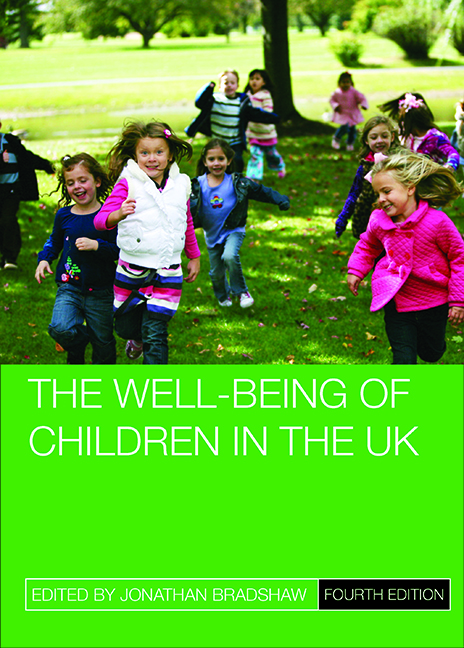Book contents
- Frontmatter
- Contents
- List of figures and tables
- List of abbreviations
- Notes on contributors
- Acknowledgements
- One Introduction
- Two Demography of childhood
- Three Child poverty and deprivation
- Four Physical health
- Five Subjective well-being and mental health
- Six Education
- Seven Housing and the environment for children
- Eight Children’s time and space
- Nine Children and young people in care and leaving care
- Ten Child maltreatment
- Eleven Childcare and early years
- Twelve Children, crime and correction
- Thirteen Conclusion
- Bibliography
- Index
One - Introduction
Published online by Cambridge University Press: 01 September 2022
- Frontmatter
- Contents
- List of figures and tables
- List of abbreviations
- Notes on contributors
- Acknowledgements
- One Introduction
- Two Demography of childhood
- Three Child poverty and deprivation
- Four Physical health
- Five Subjective well-being and mental health
- Six Education
- Seven Housing and the environment for children
- Eight Children’s time and space
- Nine Children and young people in care and leaving care
- Ten Child maltreatment
- Eleven Childcare and early years
- Twelve Children, crime and correction
- Thirteen Conclusion
- Bibliography
- Index
Summary
The true measure of a nation's standing is how well it attends to its children – their health and safety, their material security, their education and socialization, and their sense of being loved, valued, and included in the families and societies into which they were born. (UNICEF, 2007, p 1)
In the UK we have no official means of establishing how our children are doing, no ‘State of UK children’ report. This book is an attempt to fill that gap. It is the fifth in a series of volumes that has been produced out of the University of York stable since Bradshaw (2001). That book emerged from the Economic and Social Research Council (ESRC) Children 5-16 research programme, and was motivated by anxiety about the impact that the doubling of relative child poverty rates under the Thatcher government might be having on the well-being of children in the UK. It concluded by recommending that the UK should produce a regular review of the well-being of its children, and that perhaps responsibility for it could be taken by the Office for National Statistics (ONS). When this looked unlikely, Save the Children (UK) stepped in and supported the publication of two further volumes – Bradshaw (2002) and Bradshaw and Mayhew (2005). The last volume was produced with the support of the Child and Maternity Public Health Observatory (CHIMAT) in Bradshaw (2011).
The 2011 volume reported the situation of children around 2009/10, and focused on the years of the Labour government during 1997-2010. It really covered a period before the global financial crisis in 2008, and certainly before the impact of the austerity measures introduced by the coalition government (elected in 2010) could be felt. Time has passed on, and another cohort of children has gone through infancy, primary and secondary schools, and much that might affect children has changed since the last volume.
Up until 2008 the UK had experienced an unprecedented period of economic growth, with employment rates reaching record levels, and unemployment had never been so low. During this period, there were substantial increases in public expenditure on education, health, transport and cash and tax benefits for families with children. Other significant developments for children were the establishment of Sure Start, the extension of nursery education to three- and four-year-olds and substantial investment in pre-school childcare.
- Type
- Chapter
- Information
- The well-being of children in the UK (4th edition) , pp. 1 - 12Publisher: Bristol University PressPrint publication year: 2011



